Pandava
The Pandavas (Sanskrit: पाण्डव, IAST: pāṇḍava) are the central characters of the longest Hindu epic Mahabharata who fought the Mahabharata War against their cousins Kauravas for the throne of Hastinapur in Kurukshetra. They were five brothers, namely Yudhishthira, Bhima, Arjuna, Nakula and Sahadeva, acknowledged as the sons of Pandu, the king of Hastinapur and his two wives Kunti and Madri. All five brothers were married to the same woman, Draupadi. However, Yudhishthira had another wife, namely Devika, Bhima had other 2 wives, namely Valandhara and Hidimba and Arjuna had other 3 wives, namely Ulupi, Chitrangada, Subhadra.[1]


Etymology
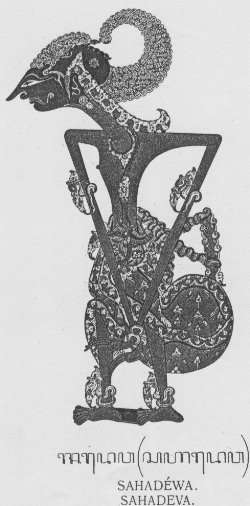
The word Pandava (Sanskrit: पाण्डवा, IAST: Pāṇḍavā) is derived from their father's name, Pandu (Sanskrit: पाण्डु, IAST: Pāṇḍu) and means "descendants of Pandu". Other epithets given to the Pandavas are:[2]
The Pandavas
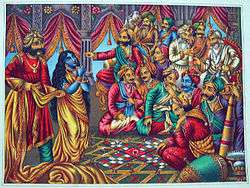
Story

The story begins with the introduction of the brothers' parents. The primary antagonist of the saga was Duryodhana (meaning of name is "unconquerable"), cousin to the Pandavas. He was the eldest of 100 brothers known as the Kauravas, who were born to Dhritarashtra, the king of Hastinapura, and his queen Gandhari, princess of Gandhara.
The Pandavas were born to Pandu and his wives, Kunti and Madri by the boon given to Kunti by Durvasa, that she could have a son by any god whom she respects without having any marital affair. After Madri's marriage, Pandu voluntary renounced royal life as penance for having accidentally killed the sage Rishi Kindama and his wife. At his death, Rishi Kindama cursed Pandu that he would surely die if he attempted to have sexual relationships with his wives. Because of this curse, Kunti had to use her boon to get sons. She bore him three sons: Yudhishthira by the god of Dharma, Bhima by the god of Wind, and Arjuna by Lord Indra. At the request of Pandu, she shared this boon with Madri to get her sons, the twins Nakula and Sahadeva from the divine Ashvini twins.
After the death of Pandu and Madri, Kunti brought the Pandavas back to Hastinapur. As children, the Pandavas and Kauravas often played together. However, Bhima (2nd of the Pandavas) was always at odds with the Kauravas, particularly with Duryodhana, who refused to accept the Pandavas as his kin. This usually led to much tension between the cousins. Insecure and jealous, Duryodhana harboured intense hatred for the five brothers throughout his childhood and youth and following the advice of his maternal uncle Shakuni, often plotted to get rid of them to clear his path to the lordship of the Kuru Dynasty.
This plotting took a grave turn when Dhritarashtra had to relent to the will of the masses and rightfully appointed his nephew Yudhishthira as crown prince. This went against the personal ambitions of both father and son (Dhritarashtra and Duryodhana) and drove Duryodhana into such a rage that he enthusiastically agreed to an evil ploy by Shakuni to murder Yudhishthira. Shakuni commissioned the construction of a palace in Varnavart, secretly built by incorporating flammable materials like oil, ghee etc. into the structure, most notably the lacquer known as lac. This palace was known as Lakshagraha. Duryodhana then successfully lobbied Dhritarashtra to send Yudhishthira to represent the royal household in Varnavarta during the celebrations of Shiva Mahotsava. The plan was to set the palace on fire during the night while Yudhishthira would likely be asleep. Yudhishthira left for Varnavrata, accompanied by his four brothers and their mother Kunti. The plan was discovered by their paternal uncle Vidura, who was very loyal to them and an extraordinarily wise man. In addition, Yudhishthira had been forewarned about this plot by a hermit who came to him and spoke of an imminent disaster. Vidura arranged for a tunnel to be secretly built for the Pandavs to safely escape the palace as it was set afire.
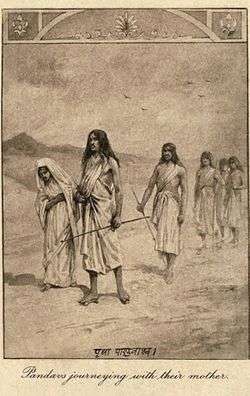
After their flight from the palace, the five brothers lived in the forests for some time disguised as Brahmins. They heard from a group of travelling sages about a contest (Swayamvara) being held in the Kingdom of Panchala that offered the princess Draupadi's hand in marriage to the winner. The Swayamvara turned out to rely on the skills of archery, and Arjuna, who was a peerless archer, entered the competition and won. When the brothers took Draupadi to introduce her to their mother, they announced to Kunti that they had arrived with excellent alms. Kunti was busy with some work, and replied without turning to look at Draupadi (who was the alms referred to) ordering the brothers to share the alms equally amongst the five of them. Even when uttered erroneously, their mother's word was supreme for the Pandavas, and they agreed to share the princess, who was subsequently married to all five brothers.
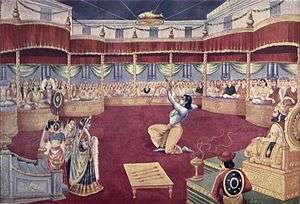
When Dhritarashtra heard that the five brothers were alive, he invited them back to the kingdom. However, in their absence, Duryodhana had succeeded in being made the crown prince. Upon the return of the Pandavas, the issue of returning Yudhishthira's crown to him was raised. Dhritarashtra led the subsequent discussions into ambiguity and agreed to a partition of the kingdom "to do justice to both crown princes". He retained the developed Hastinapur for himself and Duryodhana and gave the barren, arid and hostile lands of Khandavaprastha to the Pandavas. The Pandavas successfully developed their land and built a great and lavish city, which was considered comparable to the heavens, and thus came to be known as Indraprastha.
Reeling under the loss of half the lands of his future kingdom, Duryodhana's jealousy and rage were further fuelled by the Pandavas' success and prosperity. Eventually Shakuni sired yet another ploy and got Duryodhana to invite the Pandavas over to his court for a game of dice (gambling). Shakuni was a master at gambling and owned a pair of dice which magically did his bidding. Owing to this, bet after bet, Yudhishthira lost all of his wealth, and eventually his kingdom, in the game. He was then enticed by Duryodhana and Shakuni to place his brothers as bets. Yudhishthira fell for it and put his brothers on stake, losing them too. He then placed himself as a bet and lost again. Duryodhana now played another trick and told Yudhishthira that he still had his wife Draupadi to place as a bet and if Yudhishthira won, he would return everything to the Pandavas. Yudhishthira fell for the ruse and bet Draupadi, losing her too. At this point Duryodhana ordered that Draupadi, who was now a slave to him, be brought to the court. None of the Pandavas fought for their wife's honour. Duryodhana's younger brother Dushasana dragged Draupadi to the royal court, pulling her by her hair, insulting her dignity and asserting that she, like the Pandava brothers, was now their servant. This caused immense anguish to all the great warriors seated in the court, but each of them, namely, Bhishma (grandsire of the clan), Dronacharya (teacher/guru of Kauravas and Pandavas) and Kripacharya except Vidura remained silent. Duryodhana then ordered Dushasana to disrobe Draupadi before everyone, as a slave girl has no rights. The elders and warriors in audience were shocked but did not intervene. As Dushasana began to disrobe her, she prayed to God Krishna to protect her honour, and Lord Krishna protected her by providing her garments an unending length. Finally, as the blind king Dhritharasthra realised that this humiliation could prompt Draupadi to curse his sons, he intervened, apologising to Draupadi for the behaviour of his sons, and turned the winnings of dice game back over to the Pandava brothers, releasing them from the bondage of slavery.
Incensed at the loss of all that he had won, Duryodhana threatened suicide and coerced his father into inviting the Pandavas for one last round of gambling, the terms of which were that the loser would be condemned to 12 years of exile into forests and a 13th year to be spent incognito, and if the cover be blown during the 13th year, another cycle of 13 years would ensue. Obeying their uncle's orders, the Pandavas played the round and again lost to Shakuni's cheating. However, this time, their patience had been nearly pushed to its edge. During the 12 years of exile in the forest, they prepared for war. Arjuna performed penance and won the entire gamut of celestial weapons (Divyasatras) as boons from the Gods. They spent the 13th year masquerading as peasants in the service of the royal family of Virata, the king of Matsya. Upon completion of the terms of the last bet, the Pandavas returned and demanded that their kingdom be rightfully returned to them. Duryodhana refused to yield Indraprastha. For the sake of peace and to avert a disastrous war, Krishna proposed that if Hastinapur agrees to give the Pandavas only five villages named Indraprastha (Delhi), Swarnprastha (Sonipat), Panprastha (Panipat), Vyaghrprastha (Baghpat) and Tilprastha (Tilpat)[3][4] if these five villages given they would be satisfied and would make no more demands.[5] Duryodhana vehemently refused, commenting that he would not part even with land as much as the point of a needle. Thus the stage was set for the great war, for which the epic of Mahabharata is known most of all.
The war was intense and lasted 18 days, over the course of which both parties worked around, bent and even broke rules of warfare. At the end, all 100 Kaurava brothers and their entire army was slain, with only four surviving on their side. The Pandavas too lost several allies but the five brothers survived. After having won the war, Yudhishthira was crowned the king.
Death of Pandavas
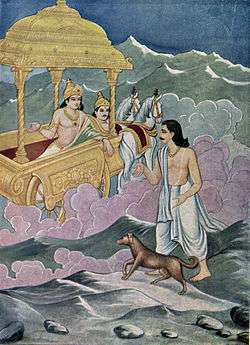
The Pandavas ruled Hastinapur for 36 years and established a righteous kingdom. Shortly after Lord Krishna left the Earth, they all decided that the time had come for them to renounce the world, as the age of Kali had started.
So the five Pandavas and Draupadi left to the path of liberation. For this purpose they all climbed Mount Kailash, which leads to the Swarga Loka. On their way, all except Yudhisthira slipped and died one by one. Yudhisthira was accompanied by a dog who was none other than God Yama himself.
The first to die was Draupadi; she was imperfect because she loved Arjuna more than her other husbands. Then it was Sahadeva, imperfect because he was overconfident about his knowledge in science. He was followed by Nakula, imperfect because he was over-enthusiastic about his good looks. Then fell Arjuna, imperfect because he was proud of his skills- he challenged Hanuman and Shiva. Next was Bhima, imperfect because he killed his enemies brutally- thus enjoyed their sufferings. Only the eldest Pandava, Yudhisthira, reached the door of Swarga Loka (heaven), carried on Lord Indra's chariot. On reaching Heaven, he did not find either his virtuous brothers or his wife Draupadi. Instead, he finds Duryodhana sitting on a divine throne.[6]
He wanted an explanation from Lord Yama, the lord of death. Lord Yama explained that the Kauravas had been allowed into heaven because they died as warriors on the battlefield. This earned them so much merit and credit that it wiped out all their debts. Yudhisthira demanded to know where his brothers and his wife were. He was then taken to hell. Lord Yama explained that they were experiencing the reactions of their actions but it was temporary. Once the debt had been repaid, they would join them in Swarga. Yudhisthira loyally met his brothers, but the sight and sound of gore and blood horrified him. Though initially he was tempted to flee, he mastered himself and remained after hearing the voices of his beloved brothers and Draupadi calling out to him, asking him to stay with them in their misery. Yudhisthira decided to remain, ordering the divine charioteer to return. He preferred to live in hell with good people than in a heaven of his enemies. Eventually this turned out to be another illusion to test him. Yama explained Yudhishtira that it was all illusion created by Yama himself. It was punishment to Yudhishtira to feel sad and soak tears on seeing his beloved ones being punished. It was because Drona felt sad on hearing fake news that his son was dead. Yudhishtira told message incompletely due to which Drona felt sad and cried in grief. Because of this, Yudhishtira had to feel sad in similar manner. Hence Yama created this illusion. In reality, Pandavas and Draupadi reached heaven just after their deaths. Yama explained everything and Yudhishtira reached heaven with his mortal body.
Krishna's help to Pandavas
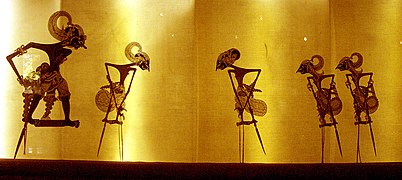
Krishna, being a well wisher of the Pandavas, helped them in various ways during the time of their ordeals. When the Kurukshetra war was going to be held, both Arjuna on behalf of the Pandavas, and Duryodhan on behalf of the Kauravas, went to Krishna to seek help. Duryodhan reached first and Arjuna was just behind him. They entered Krishna's room and found him sleeping. Duryodhan sat on a raised chair near Krishna's head and Arjuna sat near Krishna's feet closing his hands. When Krishna woke up, he saw Arjuna first and asked him about the purpose of his visit. Then he found Duryodhan sitting next to him, and asked him the same question. Krishna was then told that war was going to be held and Arjuna and Duryodhan had come to him seeking his military help. To this Krishna replied that he had seen Arjuna first and so he would give him priority, and asked what he needed. He gave Arjuna two options - either his one lakh fit and healthy army or Krishna himself who shall not fight in the war. To this Arjuna immediately opted for Krishna for his help and thus Duryodhan was given Krishna's one lakh army. Duryodhan was very satisfied to have received the huge army.
Parents of Pandavas

The first three of the Pandavas were the sons of Kunti, a Yadava and Pandu's first wife. The younger two were the sons of Madri, Pandu's second wife. Since Pandu had been cursed to die if ever he had intercourse with a woman, the actual fatherhood of the children is traditionally attributed to various gods, in virtue of a boon that Kunti had received from the sage Durvasa and had transferred to Madri.[7] Thus-
- Yudhishthira - son of Yama, the god of death
- Bhima - son of Vayu, the god of wind
- Arjuna - son of Indra, the god of rain
- Nakula - son of Ashwini Kumara Nasatya (god of health)
- Sahadeva - son of Ashwini Kumara Darsa (god of medicines)
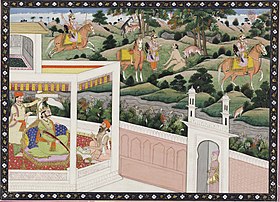
Description by Draupadi of Pandavas
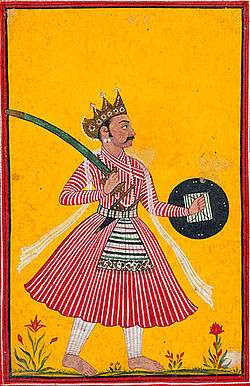
The Pandava brothers were collectively married to Draupadi. On one occasion, Draupadi was kidnapped and abducted from a hermitage in the forest by the wicked king Jayadratha. When her husbands learned of the crime, they came in hot pursuit. Seeing them approach, Jayadratha asked Draupadi to describe them. Angrily, Draupadi told the king his time was up and that the knowledge would do him no good. She then proceeded to give the description. (Mahabharat, Book III: Varna Parva, Section 268.)
- According to Draupadi, Yudhishthira possessed a "complexion like that of pure gold, possessed of a prominent nose and large eyes and endued with a slender make." Master of the spear. He was just, had a correct sense of morality and was merciful to surrendering foes. Draupadi counselled Jayadratha to run to Yudhishthira and to beg for forgiveness.
- Draupadi described Bhima as tall and long-armed. In a display of ferocity, he was "biting his lips and contracting his forehead so as to bring the two eyebrows together." The master of the mace, his superhuman feats had earned him great renown. "They that offend him are never suffered to live. He never forgets a foe. On some pretext or other he wreaks his vengeance."
- Arjuna she praised as the greatest of archers, intelligent, second to none "with senses under complete control." Neither lust nor fear nor anger could make him forsake virtue. Though capable of withstanding any foe, he would never commit an act of cruelty.
- Nakula, said Draupadi, was "the most handsome person in the whole world." An accomplished master swordsman, he was also "versed in every question of morality and profit" and "endued with high wisdom." He was unflinchingly devoted to his brothers, who in turn regarded him as more valuable than their own lives. The name Nakula generally means full of love and the male characteristics implied by the name are: Intelligence, Focus, Hard-Work, Handsomeness, Health, Attractiveness, Success, Popularity, Respect and unconditional Love.
- Finally, Sahadeva was the youngest of the brothers and like the others formidable in war and observant of morality. Master of the swords "Heroic, intelligent, wise and ever wrathful, there is not another man equal unto him in intelligence or in eloquence amid assemblies of the wise."
In arts
Harivamsa Purana (8th century CE) narrates the Jain version of their story.[8] In the Garhwal region of Uttarakhand, there has been a long tradition of villagers performing the Pandav Lila, a ritual re-enactment of episodes from the Mahabharata through singing, dancing and recitation. In the performance, the actors spontaneously break into a dance when, it is believed, they become "possessed" by the spirits of their characters.[9]
See also
- Upapandavas
- Kurukshetra war
- Mahabharata
Notes
- Devaleena Das; Colette Morrow (2018). Unveiling Desire: Fallen Women in Literature, Culture, and Films of the East. Rutgers University Press. p. 155. ISBN 978-0-8135-8786-8.
- Bonnefoy, Yves. Asian Mythologies. translated under the direction of Wendy Doniger. Chicago and London: The University of Chicago Press. 1993. pp. 180-183. ISBN 0-226-06456-5
- "Geeta Jayanti 2019 Pandavas had asked these five villages from Kauravas Know about these". Nai Dunia. 5 December 2019. Retrieved 13 January 2020.
- Jain, Ashok Kumar (1994). The cities of Delhi. Management Pub. Co. ISBN 978-81-86034-00-2.
- Journal of Indian History. Department of Modern Indian History. 1964.
- Kalra Kirti. "पांडव जब जा रहे थे स्वर्ग की ओर – तब पांडवों के साथ क्या क्या हुआ ? जानें 10 रहस्यमयी बातें". newstrend.news (in Hindi). Newstrend. Retrieved 24 May 2020.
- Vyas, Ved (4000-826 BCE (approx.)). Mahabharat. Check date values in:
|date=(help) - Upinder Singh 2016, p. 26.
- Sax, William Sturman (2002). Dancing the Self: Personhood and Performance in the Pāṇḍava Līlā of Garhwal. Oxford University Press. ISBN 9780195139150.
References
- Chakravarti V. Narasimhan; The Mahabharata. Columbia University Press, 1965.
- Singh, Upinder (2016), A History of Ancient and Early Medieval India: From the Stone Age to the 12th Century, Pearson Education, ISBN 978-93-325-6996-6

